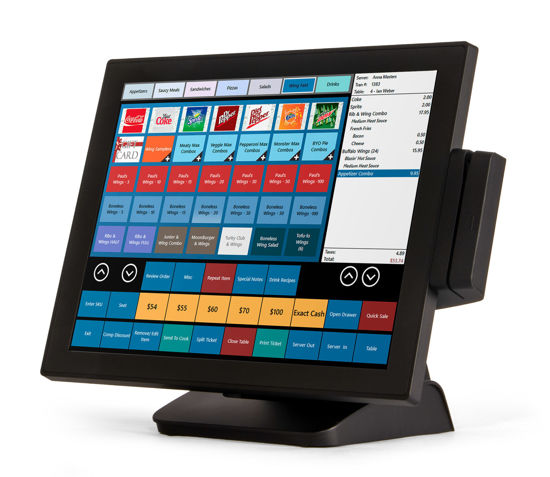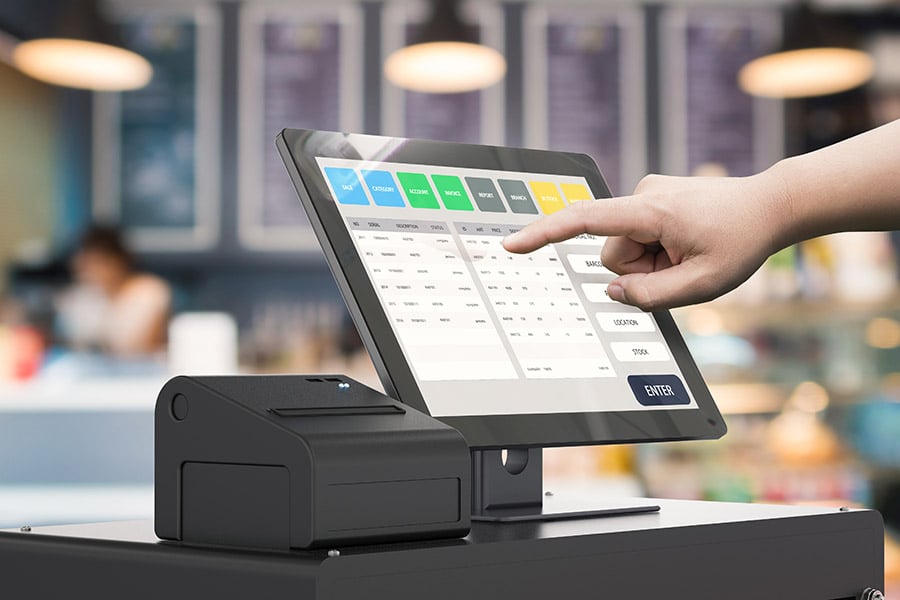Rumored Buzz on Pos Systems
Rumored Buzz on Pos Systems
Blog Article
Some Ideas on Point Of Sale Systems You Need To Know

Clover POS: Retail Point-Of-Sale Solutions Streamline Deals
Top Guidelines Of Restaurant Pos

Hardware Parts of a Point of Sale System What makes a POS system tick? It's not just software; the hardware plays a starring function. Consider it as the body to the software's brain. Without the right hardware, even the most sophisticated POS software application is just a pretty face. Vital POS Hardware So, what are the must-haves? Let's break it down. The main processing unit, frequently a computer or tablet, is the heart of the operation. The display or touchscreen display enables personnel to connect with the system. A barcode scanner accelerate the checkout procedure. Remember the days of manually getting in each code? The dependable invoice printer supplies consumers with a record of their purchase. A cash drawer keeps your cash safe and arranged. A card reader allows customers to pay with credit or debit cards. Diving Deeper: Beyond the Fundamentals However wait, there's more! Depending upon your company, you may require specialized hardware. A restaurant may integrate cooking area printers to relay orders, while a retail store may utilize label printers for product tagging. Ever question how your local bakeshop immediately prints those delicious-looking labels? Picking the Right Hardware: A Balancing Act Choosing the ideal hardware isn't practically buying the most costly devices. It's about finding the sweet area in between performance, toughness, and more info spending plan. A small company just starting out may select a more fundamental setup, while a high-volume merchant will require robust, high-performance makers. Is it much better to purchase new or used? Consider your options carefully. A new system uses the current technology and service warranty security, but a refurbished system can conserve you money. The Future of POS Hardware What does the future hold? Expect to see much more combination with mobile gadgets, biometric scanners for staff member authentication, and advanced analytics dashboards displayed on larger, clearer screens. Imagine a world where inventory is automatically updated in real-time as products are scanned-- a world where you can track your best-selling product from anywhere in the world. The possibilities are endless, and the hardware is constantly developing to fulfill the demands these days's businesses. Are you all set to upgrade your point of sale system?
Software Features and Capabilities: The Heart of Your POS System
Ever see a skilled barista slide through a busy morning rush? Their secret isn't just caffeine; it's a seamless dance with their POS system. The software is the conductor of your service symphony, orchestrating whatever from sales to inventory. But what notes should you be listening for? What capabilities truly matter in today's market?
Inventory Management: Beyond Counting Beans
Forget spreadsheets that haunt your dreams. Modern POS systems provide real-time inventory tracking, notifying you when your stock of artisanal coffee beans dips precariously low. Believe of it as a digital guardian angel, avoiding those uncomfortable "Sorry, we're out!" minutes to customers. What if you could also anticipate demand based on historical data? Numerous systems now use forecasting tools, an effective weapon against overstocking and lost sales. This assists avoid the circumstance of running out of popular products or collecting excess stock of slow-moving items, both of which can constrain money circulation and area.
Sales Reporting and Analytics: Translating the Information
Sales information is the brand-new gold, and your POS system is the miner. Forget feeling in one's bones how much you sold today. Dive deep into the information to discover trends, identify your very popular products, and comprehend client habits. Which menu product pairs perfectly with the daily special? Which promotion resonated most with your customers? These insights are not just fascinating; they're actionable intelligence. Without reputable sales reporting, browsing the complexities of organization decision-making becomes like cruising without a compass, increasing the opportunity of missteps and missed out on opportunities.
Consumer Relationship Management (CRM): Structure Bridges, Not Walls
Remembering a regular consumer's name and preferred order is lovely, however scaling that personal touch is challenging. POS systems with CRM capabilities enable you to track client purchase history, preferences, and even birthdays. Envision instantly offering a discount on their birthday-- a small gesture that cultivates loyalty and encourages repeat business. There is the possible snag of bad information quality, which can lead to inaccurate consumer profiles and inadequate marketing efforts.
Payment Processing: Enhancing the Deal
The checkout experience can make or break a sale. Seamless integration with numerous payment methods-- charge card, mobile wallets, even copyright-- is non-negotiable. Can your system handle split payments? Does it offer protected tokenization to protect client information? A cumbersome payment process resembles striking a sour note in your service symphony, potentially interrupting the entire efficiency. Guaranteeing compatibility with progressing payment innovations and adherence to security standards are paramount for maintaining client trust and operational efficiency.
Employee Management: Keeping the Team in Sync
From clocking in and out to handling authorizations and tracking performance, employee management includes streamline operations and improve responsibility. Is scheduling a headache? Numerous POS systems provide incorporated scheduling tools, enhancing staffing levels based upon anticipated demand. A typical obstacle that is typically overlooked is the challenge of incorporating worker management performances with payroll systems, which can cause mistakes and inefficiencies in wage calculations.
Advanced Features: Leveling Up Your Operations
- Table Management: Perfect for dining establishments, this function allows you to visualize your dining room, track table status, and manage appointments.
- Loyalty Programs: Reward your finest clients and motivate repeat service with integrated loyalty programs.
- Online Buying Combination: Seamlessly integrate your POS system with online purchasing platforms to broaden your reach.
Picking the best POS system has to do with more than simply functionality; it's about finding a partner that can grow with your organization. Consider your present needs, anticipate future development, and don't hesitate to ask the difficult concerns. The right software can change your service from a disorderly cacophony into an unified masterpiece.
Industry-Specific POS System Applications
Consider the local bakeshop, busy with early morning consumers craving fresh croissants. A generic POS system might handle transactions, but can it manage complex recipes, track ingredient stock, or automatically change production schedules based upon sales data? Probably not. That is where the appeal of industry-specific POS systems shines.
Dining establishments and Hospitality
For busy restaurants, speed and precision are vital. How numerous times have you seen servers managing orders, adjustments, and splitting costs, all while attempting to supply excellent service? A restaurant POS system enhances these procedures, enabling table management, kitchen area order tickets, and even online purchasing integration. These systems frequently include features like ingredient-level inventory tracking, crucial for managing food costs and lessening waste. Ever wonder why your preferred meal is often not available? It may originate from a lack of appropriate stock management.
- Table Management
- Cooking Area Order Tickets
- Online Buying Integration
- Ingredient-Level Stock Tracking
Retail Solutions
Retail, with its diverse stock and consumer interactions, requires a various set of tools. Picture a boutique clothes shop having a hard time to keep track of sizes, colors, and seasonal collections using a fundamental checkout system. An industry-specific retail POS system offers features like barcode scanning, customer loyalty programs, and comprehensive sales reporting. These systems can even incorporate with e-commerce platforms, providing a smooth omnichannel experience for customers. Did you understand some retail POS systems can anticipate future sales patterns based upon historical information? Now that is powerful!
The Dangers of an Inequality
Picking the wrong POS system can create substantial functional hurdles. A clothing boutique using a restaurant POS, for instance, would find it unsuitable for handling stock with sizes and colors. The lack of proper reporting and analytics could result in mistaken buying decisions and lost revenue. The result might be comparable to trying to fit a square peg in a round hole.
Key Factors to consider
Picking an industry-specific POS system needs careful assessment. Consider your company's special requirements and operational workflows. Does the system incorporate with existing software application? Does it provide the essential reporting abilities? Is it scalable to accommodate future development? A well-chosen POS system is not simply a transaction tool; it's a strategic asset that can drive performance, enhance customer satisfaction, and ultimately, boost your bottom line. Remember, it is an investment in your service's future, not simply an expense.
Security Factors To Consider for Point of Sale Systems
Ever heard the tale of the mom-and-pop shop that lost whatever since of a single, neglected security flaw in their POS system!.?. !? It's a cautionary tale, and it highlights a crucial element frequently overshadowed by the appeal of expensive features and structured operations. The reality is, a POS system is just as good as its security. What good is a system that crunches numbers in a flash if it allows wrongdoers to swipe customer's information just as quickly?
The Vulnerability Minefield
The digital landscape is a battleground. Every POS system, no matter size or elegance, is a possible target. Are you truly got ready for the hazards hiding around the corner? The genuine pinch comes when you find that your outdated software application has a gaping hole that hackers can make use of, turning your company into an unwitting accomplice in identity theft. The trouble is that hackers are crafty and are always altering their strategies.
Common Security Spaces and Professional Tips
- Weak Passwords: "Password123" isn't sufficing. Use strong, special passwords for all POS system accounts and alter them frequently. Two-factor authentication is a must.
- Unsecured Networks: Your Wi-Fi resembles leaving the front door open. Secure your network with strong file encryption (WPA3 if possible) and think about a separate network for your POS system.
- Out-of-date Software: Software vendors patch security holes all the time. Failing to update is like inviting problem. Establish automated updates or schedule regular maintenance.
- Employee Training: Your staff is your very first line of defense. Train them to acknowledge phishing efforts, secure passwords, and report suspicious activity.
Information Encryption: Your Guard Versus the Dark Arts
Think of data file encryption as a secret code. It scrambles sensitive information, like charge card numbers, making it unreadable to unapproved users. Without encryption, your customers' financial information are like sitting ducks, ripe for the picking by cybercriminals. It's not practically protecting your clients; it's about securing your track record and preventing substantial fines.
PCI Compliance: The Rulebook You Can't Disregard
If you accept credit cards, you're bound by the Payment Card Market Data Security Requirement (PCI DSS) It's a set of security requirements designed to safeguard cardholder information. Failing to comply can lead to fines, penalties, and even the loss of your ability to process charge card payments. It's a headache, yes, however it's a required one. Believe of PCI compliance as the cost of doing organization in the digital age.
Consider this: every deal processed through your point of sale is a prospective entry point for destructive stars. By executing robust security measures, you're not just protecting your business; you're protecting your clients' trust and making sure the long-term viability of your operations. The security of your POS system isn't simply a technical issue; it's a company important. It requires continuous caution, proactive procedures, and a commitment to remaining ahead of the curve.